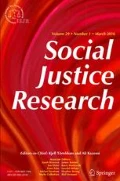Abstract
This paper examines the root of unethical dicisions by identifying the psychological forces that promote self-deception. Self-deception allows one to behave self-interestedly while, at the same time, falsely believing that one's moral principles were upheld. The end result of this internal con game is that the ethical aspects of the decision “fade” into the background, the moral implications obscured. In this paper we identify four enablers of self-deception, including language euphemisms, the slippery slope of decision-making, errors in perceptual causation, and constraints induced by representations of the self. We argue that current solutions to unethical behaviors in organizations, such as ethics training, do not consider the important role of these enablers and hence will be constrained in their potential, producing only limited effectiveness. Amendments to these solutions, which do consider the powerful role of self-deception in unethical decisions, are offered.
Similar content being viewed by others
References
Badaracco, J. L., and Webb, A. P. (1995). Business ethics: A view from the trenches. Calif. Manage. Rev. 37(2): 8-28.
Bandura, A. (1999). Moral disengagement in the perpetuation of inhumanities. Personality and Social Psychology Review, 3: 193-209.
Barth, J. (1958). The End of the Road, Seeker and Warburg, London.
Bok, S. (1989). Secrets, Vintage Books, New York.
Bok, D. (1978). Lying, Vintage Books, New York.
Browning, L. (2003). Ethics lacking in business school curriculum. New York Times, C3.
Business Week Online, (2003, January 21), Retrieved from http://www.businessweek.com
Cowley, G., Rosenberg, D., and Brant, M. (1995, July 17). A prescription that kills. Newsweek, p. 54.
Dinehart, J., Moberg, D., and Duska, R. (eds.). (2001). The Next Phase of Business Ethics: Integrating Psychology and Ethics, Elsevier Science, Oxford.
Demos, R. (1960). Lying to oneself. J. Philos. 57: 588-595.
Fandt, P. M., and Ferris, G. R. (1990). The management of information and impressions: When employees behavior opportunistically. Organ. Behav. Hum. Decis. Process. 45: 140-158.
Fingarette, H. (1969). Self-Deception, Routledge and Kegan Paul, London.
Freud, S. (1957). Splitting of the Ego in the Defensive Process. (Collected papers, James, Strachey, ed. and Trans.) Hogarth Press, London.
Haight, M. R. (1980). A Study of Self-Deception, Harvester Press, Sussex, England.
Joseph, J. (2003). National Business Ethics Survey 2003: How Employees View Ethics in Their Organizations, Ethics Resource Center, Washington, DC.
Kelman, H. C., and Hamilton, L. (1989). Crimes of Obedience, Yale University Press, New Haven, CT.
Larrick, R. P., and Blount, S. (1997). The claiming effect: Why players are more generous in social dilemmas than in ultimatum games. J. Pers. Soc. Psychol. 31: 479-486.
Lewicki, R. J., and Litterer, J. (1985). Negotiation, Richard D. Irwin, Homewood, II.
March, J. G. (1995). A Primer on Decision Making, Free Press, New York.
Maremont, M. (1996, September 16). Anatomy of a fraud. Business Week, pp. 90-94.
McGill, A. L., and Tenbrunsel, A. E. (2000). Mutability and propensity in the causal selection process. J. Pers. Soc. Psychol. 79: 677-689.
Messick, D. M. (1999a). Dirty secrets. In Thompson, L. L., Levine, J. M., and Messick, D. M. (eds.), Shared Cognition in Organizations: The Management of Knowledge, Erlbaum, Hillsdale, NJ, pp. 71-88.
Messick, D. M. (1999b). Alternative logics for decision making in social settings. J. Econ. Behav. Organ. 38: 11-28.
Messick, D. M., and Bazerman, M. H. (1996). Ethical leadership and the psychology of decision making. Sloan Manage. Rev. 37(2): 9-22.
Messick, D. M., and Tenbrunsel, A. E. (eds.) (1996). Codes of Conduct: Behavioral Research into Business Ethics, Russell Sage, New York.
Pillutla, M., and Chen, X. P. (1999). Social norms and cooperation in social dilemmas. Organ. Behav. Hum. Decis. Process. 78: 81-103.
Richards, C. (1999). The transient effects of limited ethics training. J. Educ. Bus. 74(6): 332-334.
Ritov, I., and Baron, J. (1990). Reluctance to vaccinate: Omission bias and ambiguity. J. Behav. Decis. Making 3: 263-277.
Speer, A. (1970). Inside the Third Reich, Avon Books, New York.
Tenbrunsel, A. E. (1995). Justifying Unethical Behavior: The Role of Expectations of Others' Behavior and Uncertainty. Unpublished doctoral dissertation, Northwestern University, Evanston, IL.
Tenbrunsel, A. E., and Messick, D. M. (1999). Sanctioning systems, decision frames, and cooperation. Adm. Sci. Q. 44: 684-707.
Tenbrunsel, A. E., Smith-Crowe, K., and Umphress, E. E. (2003). Building houses on rocks: The role of the ethical infrastructure in organizations. Soc. Justice Res. 16(3): 285-307.
Weil, J. (2003, April 24). `Pro forma' in earnings reports?... As if. Wall Street Journal, C1.
Author information
Authors and Affiliations
Corresponding author
Rights and permissions
About this article
Cite this article
Tenbrunsel, A.E., Messick, D.M. Ethical Fading: The Role of Self-Deception in Unethical Behavior. Social Justice Research 17, 223–236 (2004). https://doi.org/10.1023/B:SORE.0000027411.35832.53
Issue Date:
DOI: https://doi.org/10.1023/B:SORE.0000027411.35832.53




